I apologize for getting this Post out late. All week I’ve had a nasty Virus * and I’m not concentrating very well. Thank God and all the saints that I didn’t have air tickets to Greece this week~
- Not that Virus, thank God. I had a Covid test this week, just to be sure, which was negative. It wasn’t likely, since all our family has had our Covid Vaccine shots. I sincerely hope that you have, too. I don’t want to lose any readers.
+ + + + + + +
High summer is here, and and it’s time to go to Greece!
Traveling is in my blood.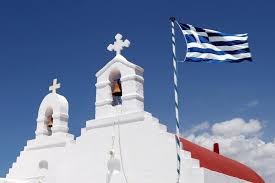 Greece is in my blood. Unfortunately… I’m old now and have health problems, and I can’t do it any more.
Greece is in my blood. Unfortunately… I’m old now and have health problems, and I can’t do it any more.
from TripSavvy site
For one thing I’d have to pack more meds than clothes! (I exaggerate only slightly.) Customs would think I’m trying to sneak God-knows-what into the country.
I can handle it. Life moves on. That was “then”; this is “now”, as they say. Every age has its disappointments and its blessings. God has a purpose in everything. It’s OK.
 But still… I long so much for the thrill of flying off to far distant places – and for Greece, that beautiful, crazy, wonderful Orthodox country. I kept a journal on all my trips, and wrote therein that I was doing it chiefly so that, when I got too old to go to Greece, I could read them and relive them. Now I am and so I do – though I’ve got to admit that I get misty-eyed when I do it.
But still… I long so much for the thrill of flying off to far distant places – and for Greece, that beautiful, crazy, wonderful Orthodox country. I kept a journal on all my trips, and wrote therein that I was doing it chiefly so that, when I got too old to go to Greece, I could read them and relive them. Now I am and so I do – though I’ve got to admit that I get misty-eyed when I do it.
However, I had no idea that I would someday be writing about them in a Blog. “A Blog? What’s that?” During most of the years of my travels, Blogs didn’t even exist.
So… we re about to go to Greece in the year 2014. This will be my next to last trip. After the last trip, what then? if I’m still here, God willing, I’ll go back and start all over again.
So, come along, if you’re of a mind – and I hope you are.
Here’s why:
The Theology of Travel
1 Take a Break.
“Remember the Sabbath day, to keep it holy. Six days you shall labor, and do all your work, but the seventh day is the Sabbath of the Lord your God. In it you shall not do any work.” Exodus 20:
Spiritually and mentally, we need a break from routine. God did not make us to be drudges. This is the Sabbath Day principle – also the coffee break principle. It is so easy to get into a rut.
Granted, to some extent ruts are good. It is a good idea to stick with the same old spouse – though a little time apart every so often isn’t necessarily a bad thing. And I think the Holy Orthodox Church is, in one way, in a very happy holy God-given rut. (No liturgical theological moral reform here, please.) However, the Church does not give us exactly the same thing each Sunday. We have the ecclesiastical year – the same old things on a varying schedule, always old, always new, forever fresh. That’s the way to do it.
The same old familiar things take on a different “feel” when we meet them somewhere else – whether it’s on the other side of the world or in Grandma and Grandpa’s house. (Remember when you were a kid?) For an example, in my Episcopal church long ago I often preached that people should give their whole lives to Jesus Christ. A guy who was a member visited another church and heard a good sermon, and he came back somewhat irritated with me. “Why”, he asked, “did you never tell us that we should give our whole lives to Jesus Christ? But I had. I had! He just needed to go somewhere else to hear it.
The same old Orthodoxy has a very different feel in Greece, where it has been part of their society for almost two millenia – as opposed to here in America, where Orthodoxy is on the fringes. We’ll say more about that in a bit.
So I recommend that if you have some money to spare, don’t waste it on expensive automobiles and fancy homes. Take it and go somewhere else and do something different. And if you haven’t extra money, go visit your grandparents or go camping – or just anything, so long as you get away. And when you do, try to visit another Orthodox church. It also will the same but different.
2. Learn. Grow. Expand your mind.
“God blessed them and said to them, ‘Be fruitful and increase in number; fill the earth and subdue it.'” Genesis 1:28
“God has made of one blood all nations of men to dwell on the face of the earth” Acts 17:26
“The Spirit of the Lord has filled the whole world, and that which contains all things has knowledge of His voice. Alleliuia.” Wisdom 1:7
Mankind has certainly fulfilled that first command. The earth is now filled with the people God created. So wherever you go, spend some time trying to find out what God has been doing there. Get to know one place well – the people, their culture or way of life. (Don’t bury your face in your smartphone.)
That is one of the reasons * why I often went back to Greece, and to the south central coast of Crete. I got to know the roads, the little towns, the churches, the ruins of ancient cities, the stop signs with multiple bullet holes in them (we’ll talk about that next week!), the villages with their big marble monuments listing all their men and boys whom the Nazis lined up and shot, as their parting gift after they had lost the war. And much more.
- Some others were the food, the beauty, the Orthodox culture, the cheap prices (if you know where to look) and – OK, if you must know – some great isolated beaches. I loved the beach with a passion and there, believe me or not, was where I got a huge amount of reading done. My suitcase was always stuffed with books.
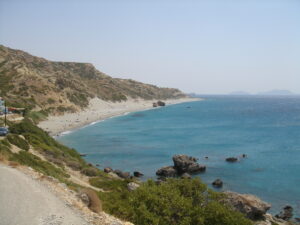
I took this one myself.
In southern Crete I got a “taste” (no more) of the place, the culture, the people. Plus, though the area isn’t over-touristed, I had interesting and occasionally startling conversations with tourists from northern Europe. I’m sad to say that on my many visits to Crete, I think I heard only one American accent – and very few elsewhere in Greece. We Americans miss so much.
What we can learn from Travel.
Now let’s get down to “brass tacks”.
God is busily at work not only here in America, but also there. That is difficult for some folks to imagine – or at least I think it is here in “Middle America” where, by the nature of things and despite some modern Latino emigration, many of us are pretty much isolated from peoples in other cultures. Consider: from Kansas City in the center of the US to the Mexican border is about 800 miles – and likewise north to the Canadian border. Now, I do not mean to 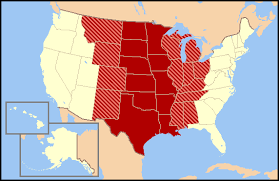 suggest that everybody in Kansas City is out of touch – only that if you live there (or here in Milwaukee, for that matter) it takes a lot of effort to learn about anyplace besides Middle America.
suggest that everybody in Kansas City is out of touch – only that if you live there (or here in Milwaukee, for that matter) it takes a lot of effort to learn about anyplace besides Middle America.
GNU Free Documentation image. There’s KC right in the middle.
Compare that to Western Europe where if you go 200 miles you’re in a different language and culture. How does this affect their mentality? and ours
And even if we go to Canada, things aren’t much different. Granted, they have efficient National Health Care, and we do not (more’s the pity, say I.) They say “aboot”, while we say “abowt”. Most Canadians tend to be calmer about politics. Some Canadian friends of mine used to refer to The Excited States of America. It was at the airport in Athens, oddly enough, that I first learned about some of the h u g e differences between the American and Canadian political systems. For one thing, personal contributions to candidates in Canada may not exceed CD$1550! USD$1250! Give that a thought.
Back to the subject:
Greece
I experienced there a very different culture from ours, even from Western Europe. Greece is on the border between the West and the East. Asia is about three miles from the far eastern Greek islands.
 Greece is Western, the “cradle of Western civilization – the great philosophers Plato, Socretes, Aristotle. Greece is a member of the EU.
Greece is Western, the “cradle of Western civilization – the great philosophers Plato, Socretes, Aristotle. Greece is a member of the EU.
Greece is Eastern. We are called the Eastern Orthodox Church, are we not? The greatest Greek Fathers came from Asia – as did our Lord Jesus and His Blessed Mother, as did the Holy Scriptures. The Greek/Byzantine Empire was ruled from Asia. The Orthodox think in a very different way from Western Christians, have a different “paradigm”. (I’m still trying to absorb that.) Much Greek pop music sounds unfamiliar to Western ears. brlow Byzantine chant is the same.
https://www.youtube.com/watch?v=jZ49-dv1HiU&t=49s
When I was alone at night and homesick, listening to Greek music on the radio did not help!
In Greece I heard and had to cope with a language that was at once familiar and unfamllar to me. In Protestant seminary I learned the Greek alphabet. But I learned that Greek is not pronounced at all the way we were taught it. When I tried to speak a little Greek, people appreciated the attempt, though one waitress “lost it” and fell into a paroxysm of laughter.
 Oh, I’ve got to tell you this one: I know a Greek-American woman who for dinner mistakenly ordered a side dish, not of “cauliflower” (kounoupidi) but of “mosquitoes”
Oh, I’ve got to tell you this one: I know a Greek-American woman who for dinner mistakenly ordered a side dish, not of “cauliflower” (kounoupidi) but of “mosquitoes”  (kounoupia). The kind waiter controlled himself, but only till he got to the side of the room. I soon learned to speak English literally, for If I used an American colloquialism (like “brass tacks”, above, for example) people would just give me a blank stare.
(kounoupia). The kind waiter controlled himself, but only till he got to the side of the room. I soon learned to speak English literally, for If I used an American colloquialism (like “brass tacks”, above, for example) people would just give me a blank stare.
Above: mosquito by J J Harrison, cauliflower by Jeremy Keith, both at Creative Commons
Greece has had 5000 years of history. America in comparison only a few hundred – except for Native American culture which we Anglos usually summarily dismiss. (We could learn some things from them, too.)
Consider the reaction of people in the Old World when we neophyte Americans assume we have all the answers. I once watched a press conference where a visiting well-meaning American secretary of state “explained things” to the Greeks. The Greek officials’ disdainful expression was priceless.
Our American homeland has suffered no real invasions. We have had relative peace. (Nobody now alive experienced our Civil War.) I don’t mean in any way to make light of “911”, but compare that to what Europeans and Oriental people have suffered on a regular basis.
Greece has experienced the rise and fall of their ancient high civilization, then incorporation into the Roman Empire. They, as part of the Greek Byzantine Empire, still greatly resent the Crusader “sack” of Constantinople and what followed – Latin occupation and the appointment of a Roman Catholic Patriarch of Constantinople, among other things. Almost immediately after the Greeks drove out the Latins, here came the fall of Constantinople to the Turks and 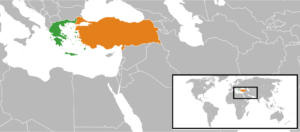 almost four centuries of Ottoman oppression. Worst of all by far were the Nazis, with their unbridled cruelty. Today the Greeks again fear the threat of a militant Turkey * just across the Aegean to the east.
almost four centuries of Ottoman oppression. Worst of all by far were the Nazis, with their unbridled cruelty. Today the Greeks again fear the threat of a militant Turkey * just across the Aegean to the east.
Above from Wikimedia Commons. Greece is the tiny country in green. Turkey is in orange. Greece has a population of about 11 million; Turkey has 83 million. Consider.
All this has given Greeks a very different mentality from ours.
So… what could an American learn by getting to know Greece and Greeks?
Nikos, the proprietor of the inn on the south coast of Crete where we usually stayed, finally got comfortable enough with me that we could talk politics. He pointed out what I knew: that after World War II Americans were greatly liked and respected by Greeks. Then he confirmed what I had already experienced – that by the early 2000s, many Greeks were almost anti-American. We talked about why. Then I came home and read about it all.
God knows I’m no expert on Greece. Between my various trips, I’ve spent only about a year there. But I think I have learned a few things.
Next, what might we learn from the Orthodox Church of Greece? How has it survived through all this turmoil almost untouched – still the same in doctrine dfand practice. Meanwhile, Western Christianity has been in turmoil for centuries, and ever more so today. Many Western European churches are almost empty these days. I have not been to Liturgy at every church in Greece! so the following is only my limited experience. However, with the exception of one parish church sometimes, e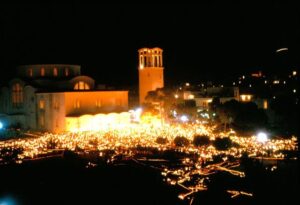 very church I have attended in Greece has been almost full, some to overflowing.
very church I have attended in Greece has been almost full, some to overflowing.
Why is the monastic life in Greece having a major revival? There are now about 1000 monasteries and sketes and hermitages in Greece.
And what is the effect of living in an Orthodox culture, where restaurants and groceries feature fasting foods during Lent, where during Pascha even TV quiz shows begin with χρήστος ανέστη! Christ is risen!”
And yet Greece seems to produce a sort of Orthodox culture which is not “dark” and “heavy”. Let me quote from a little book written by the German proprietor of the hotel where I stayed on Patmos: “While the Greek Orthodox Church plays an important but not all-dominating role in the life of its adherents, it disapproves of any religious fanaticism – its views are far too human.” That’s how it felt to me.
Am I saying old country Greek Orthodoxy has attained perfection? Of course not.. Far from it. There are many things I’d change. But it is so different from Orthodoxy and Christianity over here, and it seems to “work”.
Why? Why? Why?
My visits to Greece still leave me thinking. Spending time in Greece, usually in the same part of Greece, has caused me to ask these questions which I never had before. I think the answers have some relevance to our American situation. We can learn from them.
Here’s the point. God has been working in Greece (and every other world culture – even the non-Christian ones) all these centuries. He has also been working here in America, of course. We could learn from them – and they could from us.
And that, brothers and sisters, is what comes from Travel and trying to settle into a different culture for a while and trying to open ourselves up to it, insofar as we can.
And now: I’ve written so much Prologue that I’ve got no time for the trip! So,,,
Next Week: Greece, 2014
Week after next: The Sin of Usury
Appreciate very much your blogs: your faith, sincerity and honesty. May our gracious Lord grant you continued strength of soul and body.
In Christ,
Fr. Constantine